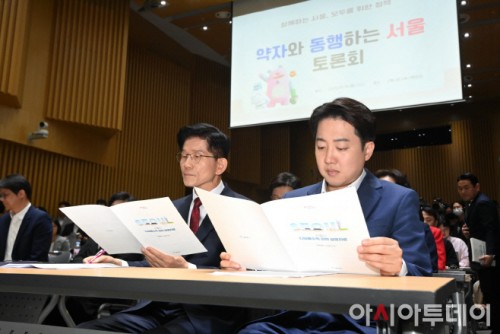 |
| Presidential candidates Kim Moon-soo of the People Power Party (PPP) and Lee Jun-seok of the Rebuilding Reform Party attend a policy debate on supporting the underprivileged at Seoul City Hall on May 19. / Photo by Song Ui-joo, Asia Today |
With just a week left until the June 3 presidential election, the Democratic Party of Korea (DPK) is intensifying its efforts to neutralize the potential impact of a candidate merger between Kim Moon-soo of the People Power Party (PPP) and Lee Jun-seok of the Rebuilding Reform Party. Viewing the potential unification as the election’s most disruptive variable, the DPK is employing a dual strategy of preemptive framing and youth outreach to blunt its effect.
On May 26, DPK leaders targeted the Kim-Lee alliance as a “coup coalition.” At a central campaign committee meeting, senior election chief Yoon Yeo-joon slammed the merger as “a baseless political stunt,” warning that “such a sham alliance has no content or vision and will collapse under its own weight and be rejected by the people.”
DPK candidate Lee Jae-myung has also been vocal in recent days. In a press conference, he called the Rebuilding Reform Party “a clone of the PPP” and predicted the formation of a “coup coalition.” During the May 23 televised debate, Lee asked Lee Jun-seok directly, “Will you unify with a coup-supporting candidate?” The remarks are seen as part of a calculated strategy to frame the unification as inevitable while using the “coup” narrative to lock down centrist voters and blunt the dramatic effect of an opposition merger.
Though DPK still holds a favorable position in the electoral landscape, internal concerns are rising that the race could shift quickly if the unification gains momentum. Recent polling shows Lee Jae-myung’s support plateauing or declining slightly, while Kim Moon-soo and Lee Jun-seok are both trending upward—fueling a sense of urgency within the ruling party to weaken the impact of a potential merger.
In response, Lee has shifted his focus to youth voters, a core base for Lee Jun-seok. On May 26, he held a town hall at Ajou University in Suwon, where he promised to expand public and youth-targeted rental housing and use surplus school land to build more dormitories.
Lee is also leaning into his “middle-ground encirclement strategy,” aimed at dominating the key battlegrounds of the capital region and the youth vote. By courting young and centrist voters—Lee Jun-seok’s primary support base—the DPK hopes to reduce any combined opposition effect to “1+1=1.5” rather than the feared “1+1=3” synergy.
“This is preemptive deflation—popping the merger balloon before it floats,” said a DPK-aligned political insider. “Candidate unifications have historically shaken up every presidential race, and this one’s no different. We can’t afford to ignore it.”
Most Read
-
1
-
2
-
3
-
4
-
5
-
6
-
7





















